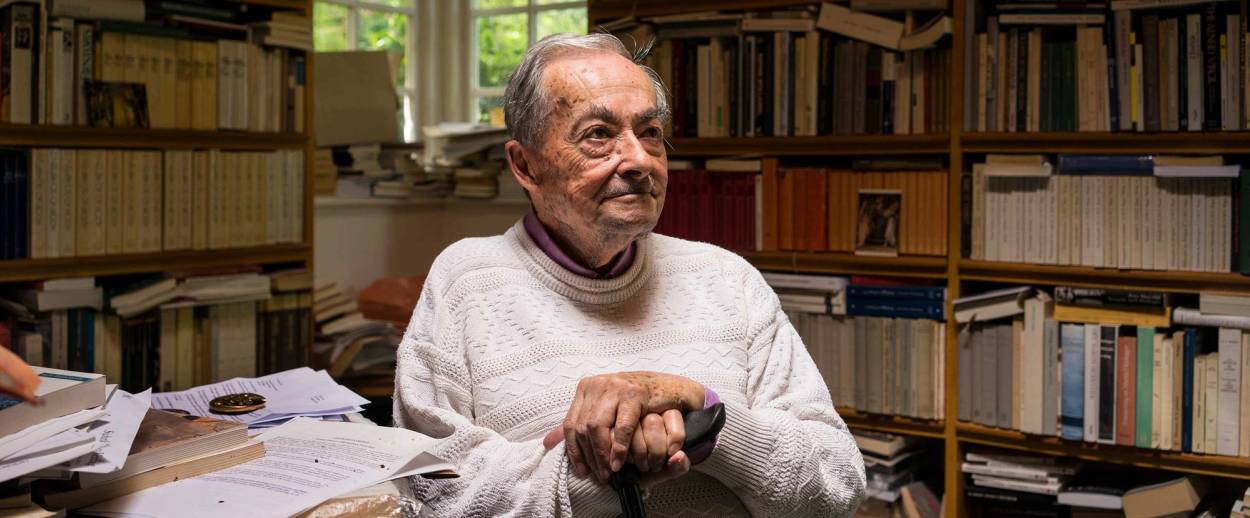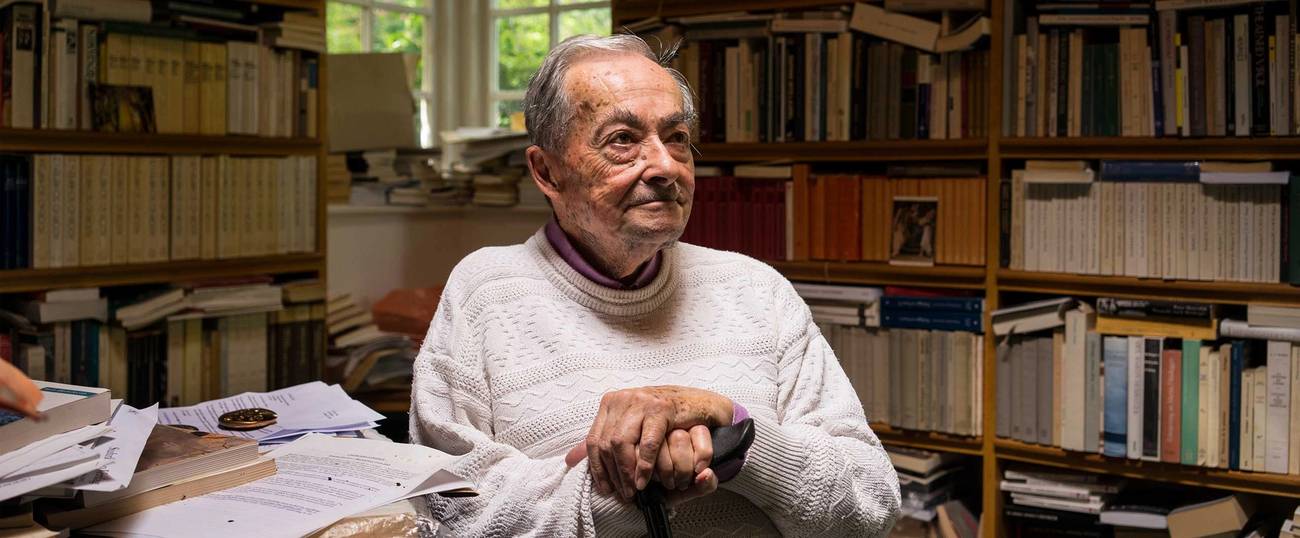George Steiner, the Prophet of Progressive Anti-Semitism
Are the philosophical roots of contemporary left-wing denunciations of Israel to be found in a radical, twisted 1970s argument about the place of Jews in Western culture?




In the 1970 T.S. Eliot Memorial Lectures delivered at Yale, the literary critic George Steiner offered a compelling explanation for the persistence of anti-Semitism: The Jews suffered for millennia as retribution for introducing the “Ideal” into Western culture. With its idealism and ethical imperatives, the revelation at Sinai “tore up the human psyche by its ancient roots,” depriving its inheritors of not just the material God and the image, but also “natural consciousness,” and “instinctual polytheistic needs.” Jews, the original Puritans, rejected the satisfaction of both the body and the image, for the purity and ascetic life dictated by the divine Word. From this perspective, Judaism represents the earliest celebration of the absolute, the West’s punishing superego, demanding idealism and self-denial, which was later incarnated in primitive Christianity and Messianic socialism, also founded by Jews, Jesus, and Karl Marx, in whose visions the Ideal persists “with terrible tactless force.” By Steiner’s lights, Hitler’s “jibe” that the Jews “invented consciousness” explains the tenacity of Western hatred of the Jews.
Western hatred of the Jews thus begins with anxiety about Jewish claims to exceptionalism. There can only be one bearer of the ideal: The city on the Hill is not Jerusalem, but Rome, later London, and even later still, Boston. In this form of anti-Semitism, which Steiner both described and in some ways endorsed, Jews are loathed because they represent a reminder of their antecedent claim to the Ideal—a claim that causes such anxiety that it must be extirpated. Non-Jewish messianic movements reject the notion of Jewish exceptionalism, because they are the exceptional ones. The continued existence of the Jews, and the resurgence of Israel, are troubling reminders that that the Jews were first to be singled out as God’s “chosen people.”
Steiner’s writings on the State of Israel provide an early primer on the dynamics of the specific form of secular anti-Semitism that has captivated so many progressives in academia and among the rank and file of the British Labour Party, as well as, increasingly, among American progressives. For Steiner, nationalism is a “madness,” as is the “vulgar mystique of flag and anthem.” But it is Israel’s “barbed wire and watch-towers of national dogma” that represent a “rhetoric of self-deception as desperate as any contrived in the history of nationalism.” For Steiner, and in this, contemporary progressives follow him, Israel must bear all the sins of the nation-state. The Greek dramatist Aeschylus in his celebration of Athens—the Oresteia—avows that the city-state is founded on blood: For contemporary progressives, as for Steiner, only Israel, the nation-state ne plus ultra, has blood on its hands.
To be sure, the narrative of Israeli independence, the celebration of the Jewish State as an indigenous people’s movement, remains haunted by a different narrative, that of naqba, with Israel figured as a colonialist interloper. The profile of the latter narrative becomes even more compelling given Israel’s uncomfortable position in the cultural history of the 20th century. The great writers of international modernism, Eliot, James Joyce, and Ezra Pound, celebrated the Greek idea of Nostos, return. For all three, return was a literary journey—to classicism, especially to the writings and culture of the Greeks. Joyce’s take on Homer’s Odyssey, Ulysses, was published in 1922, the same year as the League of Nations confirmed the Mandate for Palestine. Eliot’s rewriting of Aeschylus, “The Cocktail Party,” was published in 1949, a year after Israel’s founding. Jewish return—the particular chutzpah of the Zionist enterprise—entailed not a literary, but a literal embodiment of return, the ingathering of the exiles, the Jewish people in the State of Israel. For literary modernists, return was a cultural ideal; for Jews, it was a millennial-old dream, actually realized on land that other people claimed as their own.
That the postwar West turned decisively away from the worldview expressed in international modernism made the Jewish State, in a context of the new postmodern emphasis on difference and the other, seem even more retrograde. Steiner, though himself a classicist by training, prefers the vision of Jewish nationhood expressed in the anti-ideal of the postmodern “homelessness” of “textuality.” For him, the Jewish homeland should remain a marginal literary enterprise, a figure of speech and nothing more. The literal return to Zion, for Steiner, is therefore the last and most unfashionable of the modernist projects.
From a postmodernist perspective, Jews and Israel especially, having barely escaped the old-style anti-Semitism of the Nazis, express their chosenness once more—in a hideous affront to a sensibility that renounced all forms of exceptionalism. It is this drive that explains why the Boycott, Divestment, and Sanctions (BDS) movement, with its ostensibly universalist human-rights agenda, specifically denies Jewish difference, that is, the exceptionalism made concrete in Jewish statehood, while insisting on the absolute moral and political necessity of a Palestinian state, no matter how theocratic such an entity might be.
Apologists can argue about the nuances of “From the River to the Sea,” but the slogan chanted by Hamas operatives on the Gaza border, Hezbollah terrorists in Lebanon, and college students on American college campuses, in its most generous interpretation, advocates the ideal of a one-state solution, an ivory tower fantasy that could only come into being through catastrophic bloodshed and loss of human life. In its advocacy of this academic pipe dream, BDS has become the civilized and politically acceptable veneer for advocacy of the destruction of the Jewish State.
Western hatred of the Jews begins with anxiety about Jewish claims to exceptionalism.
But for all their anti-exceptionalist rhetoric, it is obvious that progressives have appropriated the rhetoric of Jewish exceptionalism as their own. Where for Steiner, Jewish consciousness is based upon the transcendent ideal, the truth of the progressive consciousness takes a Christian turn, and is incarnate, in every individual. Although progressives claim complexity and nuance, in regard to Israel/Palestine, their views are absolute: The Palestinians are good, while Zionists are evil. If only the Jews would divest themselves of their particularity, their unnecessary claims to nationhood, they might be tolerated, but Israel, as national project, is the devil of the nation-state made flesh.
Steiner is unabashed in his forthrightness, acknowledging the Jewish nationhood to be so abhorrent, “monstrous,” that he finds himself compelled to ask: “Has the survival of the Jew been worth the appalling cost?” and “Would it not be preferable, on the balance sheet of human mercies, if he was to ebb into assimilation and the common seas?” For Steiner, and his adepts, Jews should properly inhabit the utopian no-place of textuality, the shtetl of their study halls, a real-life version of the Hasidic dolls and figurines sold at shops in Poland.
Jewish Zionists—for Steiner, Jews are defined by their Zionism—deserve this fate, because they bear the lasting historical guilt of having introduced the horrifically oppressive idea of a transcendent and abstract God. They are responsible for the Western addiction to “speculative abstractions,” which in their grasp are not only dangerous but, in contemporary parlance, weaponized, murderous. Zionism is the last cultural gasp of the Jewish claim to be arbiters of absolute truth—a cardinal postmodernist sin—and are all the more guilty for having transformed this warped idea into a lived reality. The nation-state is flawed, but only Israel, in a postmodernist expiation for the sins of all other nations of the world, is to be not only reviled, but extirpated.
Israel’s imperfections are many, and a significant majority of Israelis want them confronted. But Steiner’s absolutist metric is applied only to Israel. For all other countries, as the philosopher Hilary Putnam writes, “enough may not be everything, but enough is enough.” The Jews alone are held to an impossible standard of perfection.
Steiner’s perverse version of the exilic Jew does have the virtue of being genuine; indeed, he utters the truth that left-wing contemporary critics of Israel dare not mention (at least publicly): It would be better for Israel not to exist at all. The allegorical morality play of radical and irredeemable Israeli evil thus gave birth to a corrosive new version of anti-Semitism, a sweeping new variant of the world’s oldest hatred dressed up as political idealism.
***
You can help support Tablet’s unique brand of Jewish journalism. Click here to donate today.
William Kolbrener is professor of English Literature at Bar Ilan University in Israel. His most recent work isThe Last Rabbi: Joseph Soloveitchik and Talmudic Tradition.